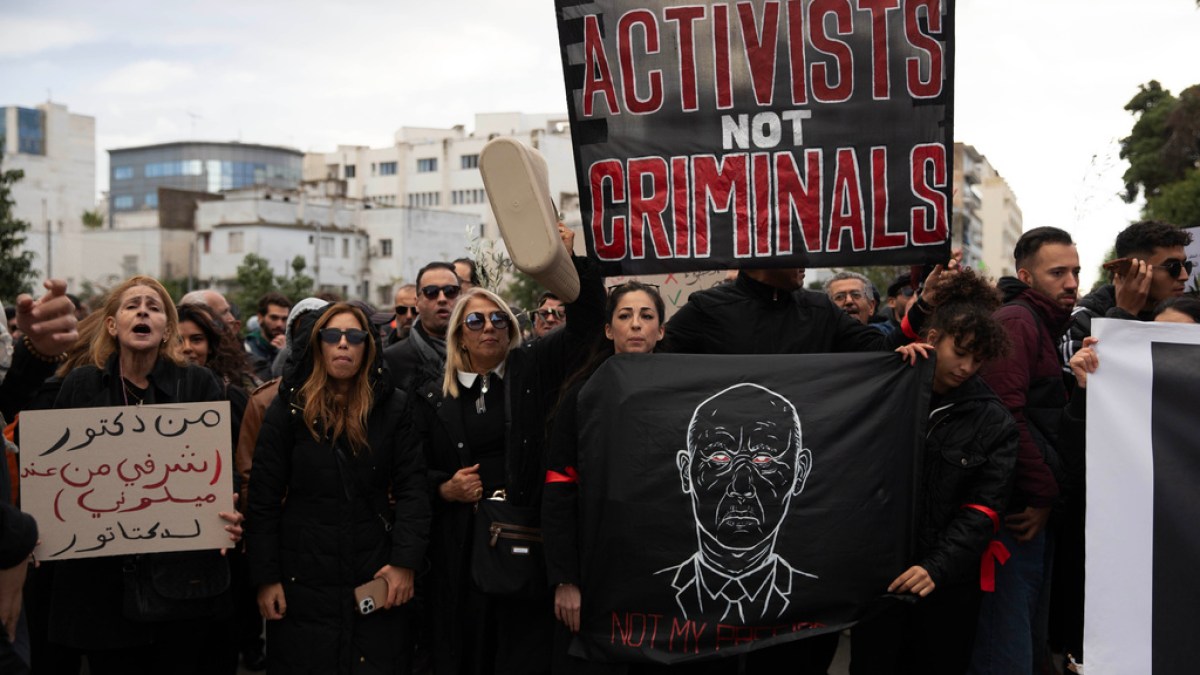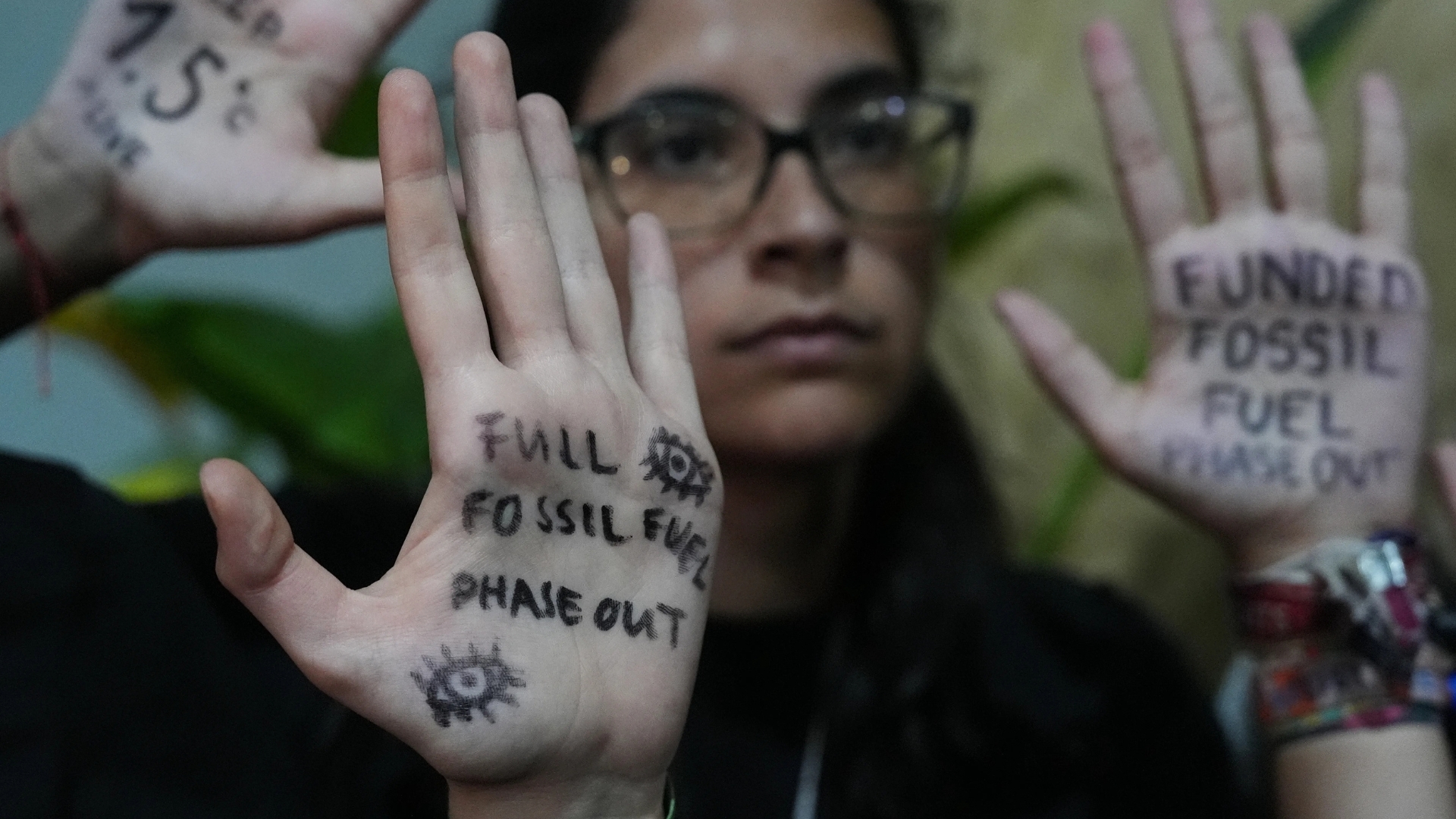Thousands of protesters have taken to the streets of the Tunisian capital to protest against what they call President Kais Saied’s escalating authoritarianism and the jailing of government critics.
At least 2,000 people, wearing black and carrying whistles and red ribbons, marched through Tunis on Saturday, chanting slogans, including “the people want the fall of the regime” and “no fear no terror, the street belongs to the people”.
Recommended Stories
list of 3 itemsend of list
Some held placards that read, “Enough repression” and “Not my president”.
The rally – under the slogan “against injustice” – brought together activists, NGOs and fragmented parties from across the spectrum in a rare display of unity in opposition to Saied.
It came weeks after a Tunisian court handed a five-year prison sentence to former administrative judge Ahmed Souab, a vocal critic of the politicisation of the judiciary.
Tunisian journalist Said Zouari told Al Jazeera the protests show a newly found unity between the groups of various ideological backgrounds.
“But these protests are not finding any echo in the Carthage Palace,” Zouari told Al Jazeera, referring to the presidential residence.
The Tunisian government has jailed dozens of opposition figures, journalists, lawyers and businesspeople, accusing them of “conspiring against state security”.
But critics say Saied is using the judiciary and police to target his political opponents.
They warn that democratic gains in the birthplace of the Arab Spring in the years since the 2011 revolution that toppled longtime Tunisian leader Zine El Abidine Ben Ali are disappearing.
“All the progress of the past 14 years has been overturned,” said Ayoub Amara, one of the organisers of Saturday’s protest. “Tunisia is big enough for all Tunisians, and no single person can rule it according to his whims.”
Monia Brahim, the wife of jailed opposition figure Abdelhamid Jlassi, said she joined the march because she believes “many Tunisians are facing deep injustice”.
“I came to defend my rights as a citizen,” she told The Associated Press news agency. “Political prisoners know for a fact that they are in prison to pay the price for their principles, their constitutional right for civil and political activism, and are being held hostage by the regime established today in Tunisia.”
Among those detained, some are currently on hunger strike, including constitutional law professor Jaouhar Ben Mbarek, who has been striking for more than 20 days.
The march on Saturday came as part of a broader surge in protests nationwide over political and economic turmoil under Saied’s rule. On Thursday, Tunisian journalists protested against the widening crackdown on the freedom of the press and the temporary suspension of several prominent civil society organisations.
Saied was democratically elected in 2019, succeeding Beji Caid Essebsi, who died earlier this year. The 70-year-old suspended parliament and consolidated all branches of power in 2021 before moving to prosecute political opponents and former officials.
Early in Saied’s tenure, the Tunisian government focused its crackdown on the Ennahdha Party, which was part of Essebsi’s governing coalition.
Tunisian courts have handed several jail sentences to Ennahdha’s leader, former Parliament Speaker Rached Ghannouchi, in cases that his supporters say are politically motivated.
Even Saied’s former allies have not been spared by the crackdown.
Nadia Akacha, the Tunisian president’s former chief of staff, who was considered one of his close and influential aides, was sentenced to 35 years in prison in absentia in July.
Rights groups have also accused Saied of pushing to suppress civil society in Tunisia.
Amnesty International said earlier this month that the crackdown on rights groups has reached critical levels with arbitrary arrests, detentions, asset freezes, banking restrictions and suspensions targeting 14 NGOs.
Human Rights Watch, meanwhile, has said that more than 50 people, including politicians, lawyers, journalists and activists, have been subjected to arbitrary arrest or prosecution since late 2022, for exercising their rights to freedom of expression, peaceful assembly or political activity.
The rights group also warned that broad antiterrorism and cybercrime laws were being utilised to criminalise dissent and tame all forms of free speech.





